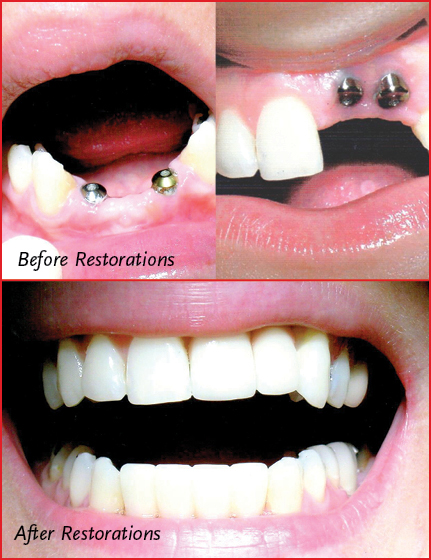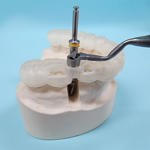
Sometimes the best-laid plans go awry. For her sister’s bachelorette party, “Maria” (name has been changed), a twenty-year-old, did everything right. She called a cab to take her and the other bridesmaids to celebrate in downtown Chicago. That night, no one needed to be a designated driver—everyone could enjoy the evening, worry free, and have fun.
Unfortunately, during the cab ride home, Maria’s taxi driver got into an argument with another cab driver and the ensuing accident cost Maria her six incisors.
After her oral surgery, which included the removal of six fractured and/or avulsed incisors, the fixation of her buccal plate, bone grafts and placement of four implants, Maria visited her personal dentist and explained the situation. The automobile insurance from the accident would pay for the claim, but she was unable to prepay. She asked her dentist if he would wait for payment, which would arrive in about six to nine months. Her dentist (a dentist whom she had seen since she was seven years old) refused.
Maria then went to four other local dentists and pleaded her case but was repeatedly rejected. In frustration, she called the oral surgeon and asked for his help in getting a referral. He called me, probably because he knows I’m a pushover … I mean, a warm caring individual.
The oral surgeon explained all the pertinent details about the accident and referred the lawyer handling the insurance company to me. I did a bit of research and discovered that the lawyer had a good reputation and I couldn’t see any record of frivolous lawsuits. So I went out on a limb a little bit (because sometimes insurance companies can take a long time to pay), but because of the lawyer’s good reputation, I decided to help out. I agreed to do the dentistry and wait for payment.
After fabricating flippers/temporary partials as provisionals for her, we waited the prerequisite amount of time for proper osseointegration of the implants and then did her final restoration. Because Maria was a twenty-year-old young woman and because quality (not price) was most important, I chose to use Arrowhead’s Elite crowns to restore her teeth. As you can see, the results were beautiful.

What did I get in return? Well, I got a hug from the patient, a thank you from her mother and an entire family of new patients. Moreover, I received a phone call from the attorney who handled the case. He not only thanked me for taking such good care of Maria but after meeting with her, he raved about the beautiful dentistry. Upon additional conversation, I learned that we both visit the same lake in Minnesota during the summer, and I got an open invitation to go Musky fishing with him. The lawyer was so impressed, he is keeping me in mind for any further restorative cases that come his way. Eventually (about eight months later), I also got paid.
The real benefit of doing this case, however, was networking with the oral surgeon. This case was not only a favor, but it also showcased my restorative skills. Now, when he has an unattached patient that needs implant restorations (whether for fixed or removable implant retained prosthetics), he refers them to me, as he knows they’ll be in good hands.
A few weeks ago, I had lunch with the oral surgeon and his new associate and he told his associate that I was the “go-to guy” for restorative cases. Talk about making my day! After this case, our professional relationship has grown, his referrals have greatly increased and it truly made it all worthwhile. So, give a little, take a chance, you may get a lot in return.
Tips for Taking On Accident Insurance Cases
Personal injuries from auto accidents and other mishaps commonly result in dental problems. Insurance companies should pay for treatment claims. But often it’s a long process as lawyers and insurance companies determine fault and accept responsibility. For example, I waited about eight months to receive payment for Maria’s case. Cases can be complex. Remember, as with any case, charge for the difficulty of the case and not on a per tooth basis. To ensure that insurance providers pay on a claim, dentists should follow a few tips:
• Do Your Due Diligence on the Attorney. Whenever a lawyer approaches me about an insurance case, I always take into consideration the reputation of the lawyer before accepting the patient. Research the attorney involved and make sure he or she has a good record.
• Be Cautious with Workers’ Compensation Cases. The claims process for Workers’ comp. cases can be lengthy, complicated and the reimbursement rates are often low. I sometimes make an exception if the injured person is already a patient of record.
• Put a Lien on the Settlement. In personal injury cases, insurance providers pay individuals for medical treatment, rather than the healthcare providers directly. The patient typically has a responsibility to pay the healthcare providers for treatment after the settlement. To ensure compliance with this agreement, put a lien on any settlements. The lien will be for the specific cost of treatment and can accumulate to the date of settlement. Check with your accountant and state law to see if any interest can be accrued during the delay in payment. Personally, I do not add on interest, but it may be an option.









